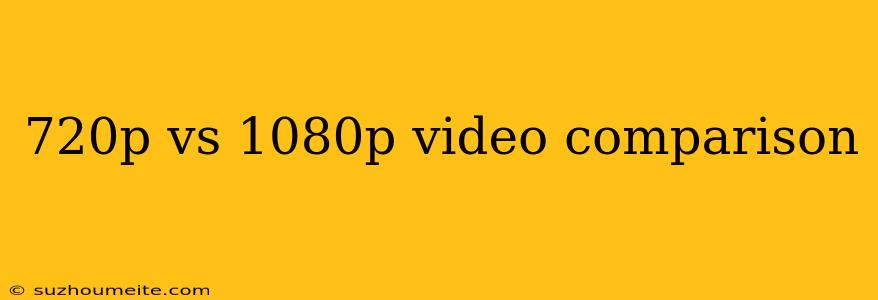720p vs 1080p Video Comparison: Which Resolution Is Right for You?
Choosing the right video resolution can be tricky, especially with so many options available. While 4K and 8K are gaining popularity, 720p (1280 x 720 pixels) and 1080p (1920 x 1080 pixels) remain the most common resolutions for many devices and platforms. But what's the difference between them, and which one is better for you?
Understanding the Basics
Resolution refers to the number of pixels that make up an image or video. The higher the resolution, the more pixels there are, resulting in a sharper, more detailed image.
720p is also known as HD (High Definition), while 1080p is often referred to as Full HD. This highlights the difference in clarity between the two resolutions. 1080p has almost double the number of pixels compared to 720p, leading to a noticeably sharper picture.
720p: The Pros and Cons
Pros:
- Smaller file size: 720p videos require less storage space and bandwidth, making them easier to download and stream, especially on mobile devices or slower internet connections.
- Widely compatible: 720p is a universal resolution supported by most devices and platforms.
- Suitable for smaller screens: 720p resolution is sufficient for smaller screens like smartphones and tablets, where the difference compared to 1080p may not be as noticeable.
Cons:
- Less detail: The lower pixel count results in a less sharp and detailed image, especially on larger screens.
- Limited for high-resolution content: 720p may not be ideal for high-quality content like movies, documentaries, or gaming, where details are crucial.
1080p: The Pros and Cons
Pros:
- Crisper and sharper image: 1080p offers a significantly clearer picture with more detail, enhancing the viewing experience.
- Excellent for larger screens: 1080p is the ideal resolution for larger screens like TVs and monitors, showcasing a richer visual experience.
- Better for detail-oriented content: The higher pixel density makes 1080p perfect for watching movies, documentaries, and playing video games where finer details matter.
Cons:
- Larger file size: 1080p videos require more storage space and bandwidth, potentially causing buffering issues on slower internet connections.
- May not be necessary for smaller screens: 1080p resolution might be overkill for smaller screens, as the difference compared to 720p may not be noticeable.
Choosing the Right Resolution
Ultimately, the best resolution for you depends on your individual needs and preferences:
- If you prioritize storage space, bandwidth, and compatibility: 720p is a solid choice, especially for smaller screens and mobile devices.
- If you want the sharpest image quality and are willing to compromise on storage space and bandwidth: 1080p is the way to go, particularly for larger screens and high-quality content.
Remember, the choice between 720p and 1080p is subjective and depends on your specific needs. Evaluate your viewing habits, screen size, and internet connection to determine the resolution that best fits your viewing experience.
